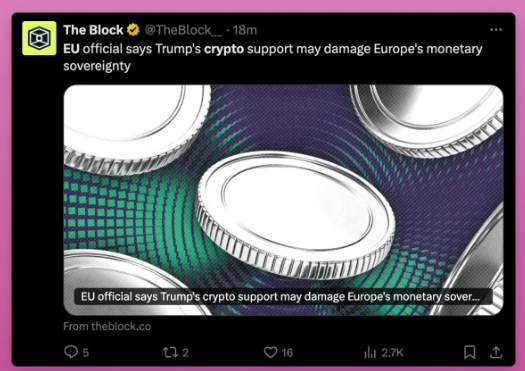
Do not misunderstand me - the former US government's cessation of regulatory scrutiny is a positive development for the cryptocurrency industry. However, the cryptocurrency industry is walking a tightrope under the current Trump administration.
How to change the perception of cryptocurrencies to make them more open and fair
The reputation of cryptocurrencies will not repair itself. If we want mainstream adoption, we need to reshape the narrative.
Easier said than done, but it must start from within: even the crypto natives are losing faith in cryptocurrencies.
I believe we need to focus on three key points:
- Make cryptocurrencies great again
In previous cycles, newcomers to cryptocurrencies were able to make money. However, the abuse and exploitation of low-liquidity, high-FDV meme coins backed by certain groups and VCs has left little room for newcomers to profit.
We have successfully resisted low-liquidity, high-FDV projects this cycle, but have still fallen into the meme coin group's trap.
Legion and Echo are making progress by adopting fairer financing models, but they are still too exclusive. We need to create and promote games that create value rather than destroy it, so that early entrants can all benefit.
Kyle has proposed a more detailed plan based on "first principles" to rise from the market chaos.
But due to extreme short-termism, maximum extractive culture, and dishonest people, we have descended into this eternal financial nihilism self-cannibalization cycle - where everyone thinks it's a good idea to keep rushing into random scam coins, thinking "I'll get out before they scam".
 We need to self-regulate bad actors. The industry must do more to expose scams and hold influencers accountable for misleading promotions. ZachXBT has done this work, but the scale of criminality has spiraled out of control, to the point where he himself has ultimately discarded a meme coin gifted to him.
We need to self-regulate bad actors. The industry must do more to expose scams and hold influencers accountable for misleading promotions. ZachXBT has done this work, but the scale of criminality has spiraled out of control, to the point where he himself has ultimately discarded a meme coin gifted to him.
I also need to do better in this regard and distance myself from value-extractive activities. People need to actually make money while expanding the crypto market share.
Now, newcomers often suffer severe economic blows, if not worse.
2. Shift the narrative from speculation to utility
Cryptocurrencies are not just gambling - they provide real-world benefits.
We need to shift the focus to practical use cases like remittances, financial inclusion, and transparent governance, rather than meme coin culture.
DeFi is expanding, and emerging social networks are bringing innovative monetization models, like Lens, Abstract, and Farcaster. Additionally, the adoption of stablecoins and RWAs (real-world assets) is increasing, helping to preserve and grow wealth, rather than destroy it.
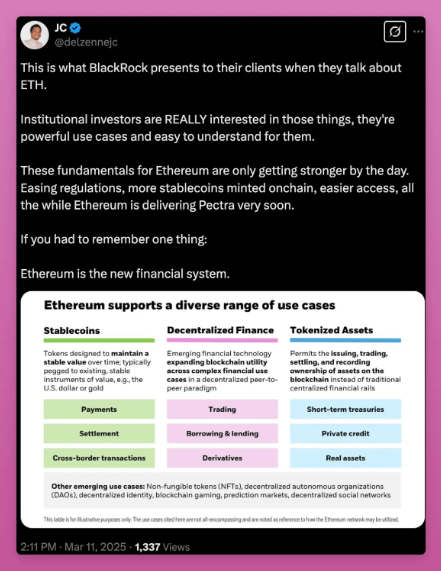
The KOLs on X platform may not care about this, but X crypto only represents a small part of the broader crypto culture.
I'm glad Bitcoin is performing well as "digital gold", but Ethereum and Solana are seen as speculative chains, rather than foundational platforms for an open digital economy.
If we take meme coins as the representative of crypto culture, I'd bet Pudgy Penguins will be the strongest Web3 export to Web2, rather than the meme coin imports (like Doge, Pepe, etc.) from Web2.
3. Reclaim the narratives of Bitcoin and Ethereum
Cryptocurrencies are not a unified culture; they contain multiple subcultures. The most prominent of these are Bitcoin and Ethereum.
The notion that "Bitcoin has become everything it was meant to destroy" troubles me greatly. Only those who hold Bitcoin in cold wallets can truly understand the peace of mind that self-custody and disintermediation bring.
ETFs benefit our wallets, but they are a double-edged sword, as ETF buyers cannot experience the freedom that self-custody provides.
I also hope Bitcoin can successfully distance itself from the MAGA movement. Bitcoin is global and should remain neutral.
This is why I like Ethereum. Many criticize the Ethereum Foundation for not cozying up to the Trump team, but in the long run, this will prove to be a successful strategy.
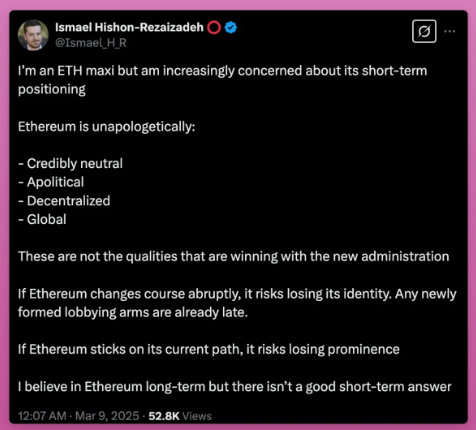
In a world where privacy and democracy are being eroded, where AI blurs the lines between reality and illusion, and digital asset ownership is not guaranteed, Ethereum provides a safe haven.
Ethereum unapologetically exhibits the following traits:
- Credible neutrality
- Non-political
- Decentralized
- Global
Those outside of crypto don't understand it, so we have a responsibility to spread this message and build products that can truly showcase Ethereum's value.
An optimistic future
Today, the entire cryptocurrency market capitalization has just reached $2.7 trillion. But do we deserve this achievement?
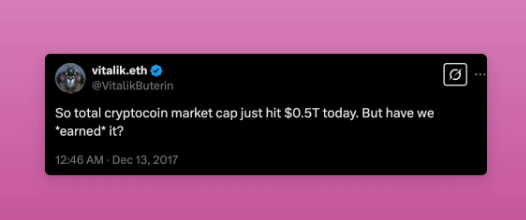
Since Vitalik's post in 2017, cryptocurrencies have evolved, and not all of it has been speculation and negative games.
As I wrote in my previous post, there are 1.4 billion people globally who are unbanked. Even in the US, this ratio reaches 4.5%. The Federal Reserve's research found that high-income individuals view cryptocurrencies as investment tools, while low-income individuals primarily use them for transactions. 60% of traders have annual incomes below $50,000, and 13% are unbanked.
Venezuela ranked 40th in the 2023 Chainalysis Crypto Adoption Index. Stablecoins have become a lifeline in the face of severe hyperinflation. Similar to Argentina, when their national currency plummets, stablecoin purchases surge - demonstrating the widespread adoption of cryptocurrencies.
Cryptocurrencies are not just a response to inflation; they are also used to resist oppressive regimes. During the COVID-19 pandemic, cryptocurrencies were used to deliver aid to doctors and nurses in Venezuela, bypassing the interference of the corrupt government. Ukraine raised $225 million in cryptocurrency donations when the war broke out.
The total value locked (TVL) in DeFi has reached $88 billion! Decentralized exchanges (DEXs) are now challenging centralized exchanges (CEXs), and platforms like Maker are bringing real-world assets (RWAs) onto the blockchain.
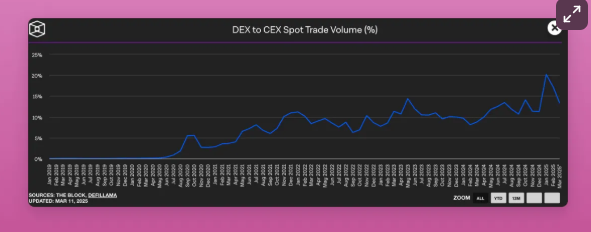
Non-speculative, decentralized social applications are also growing rapidly. Farcaster and Polymarket have thousands of users daily, and the user numbers are still increasing. We now truly have usable dApps.
However, all of these advancements seem to be overlooked on the X platform's timeline, and we have done a poor job of spreading this mission.
Nevertheless, I believe that the current market downturn will help the crypto industry recover, and progress will continue. We first need to clean up our own mess and focus on promoting the positive aspects of cryptocurrencies.




